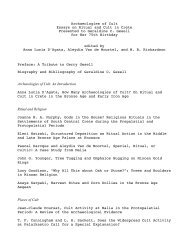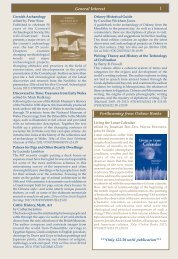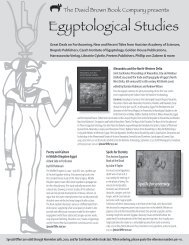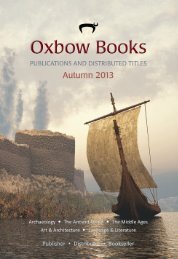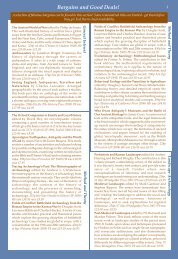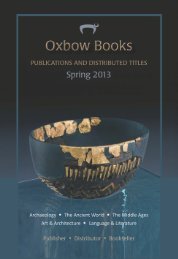New Distributed Titles Fall 2009 - Oxbow Books
New Distributed Titles Fall 2009 - Oxbow Books
New Distributed Titles Fall 2009 - Oxbow Books
Create successful ePaper yourself
Turn your PDF publications into a flip-book with our unique Google optimized e-Paper software.
Reconstructing the Epic<br />
Cross-Readings of the Trojan Myth in Hellenistic Poetry<br />
by Evina Sistakou<br />
The Trojan War inspired a multifaceted mythological tradition which evolved through a variety of artistic devices – oral and written<br />
poetry, prose, and iconography. In the open system of Trojan War narratives, Homer represents the dominant line, while the cyclic, lyric<br />
and tragic poets offer a host of alternative versions. Reconstructing the Epic builds on the premise that the reception of the Trojan myth<br />
by the Hellenistic avant-garde reflects their aesthetic and ideological distancing from the elevated genres of the past, particularly the<br />
epic, and monitors the various stages of this modernistic reaction to the literary tradition.<br />
210p, paperback, 9789042921177, $79.00, Peeters Publishers, December 2008, Hellenistica Groningiana 14.<br />
Roman Perspectives<br />
Studies on Political and Cultural History, from the First to the Fifth Century<br />
by John Matthews<br />
The fifteen papers in this volume discuss issues of Roman social, cultural and political history from the foundation<br />
of the Principate to the age of barbarian settlements of the west. Working imaginatively from within<br />
the diverse evidence, they show the institutional continuity of the Roman empire between its early and later<br />
periods, and reveal the roots of political behavior in social practice.<br />
350p, b/w illus, hardback, 9781905125395, $100.00(s), Classical Press of Wales, December <strong>2009</strong>.<br />
Xenophon and Sparta<br />
edited by Anton Powell and Nicolas Richer<br />
This volume deals with Xenophon, to whom we owe a very large part of our image of the Lacedaemonians.<br />
Uniquely among surviving writers, Xenophon campaigned with Spartan commanders in the field. His<br />
Agesilaos is a eulogy of a Spartan king he knew personally, his Constitution of the Lacedaemonians an intimate<br />
document of a different sort. Here, internationally-recognized authorities on Sparta examine Xenophon’s<br />
close – arguably too close – relationship with the most powerful Greek state of his day.<br />
350p, hardback, 9781905125371, $100.00(s), Classical Press of Wales, December <strong>2009</strong>.<br />
A Roman Miscellany<br />
Essays in Honour of Anthony R Birley<br />
on his Seventieth Birthday<br />
edited by Hans Michael Schellenberg,<br />
Vera Elisabeth Hirschmann and Andreas Krieckhaus<br />
Contents: Kritische Passagen zu Konstantin; Soldiers and Leaders in<br />
Plutarch’s Galba and Otho; Reflexions on Hadrian, Antiochus Epiphanes<br />
and the Jews; Neue Diplome für die Hilfstruppen von Britannia; Footnotes<br />
to The Fasti; Die phrygische Opposition; Paulinos Mystes; Urbanism,<br />
epigraphy and identity in the towns of Britain; Sulpicii Alexandri;<br />
Choosing a Cognomen in Rome; Anmerkungen zu Heron von Alexandria;<br />
Vereinigungen in Tarsos; A Forgotten Masterpiece of Cartography; Sallust und das ‘Massaker von Cirta’;<br />
Fragment einer Bauinschrift aus Sexaginta Prista; Pullarii, Marsi, Haruspices, and Sacerdotes in the Roman<br />
Imperial Army; Apollodorus’ Poliorketika; Zur Münzemission in Anemurion unter Kaiser Maximinus Thrax.<br />
236p, 51 b/w illus, 3 maps, 10 maps on CD-ROM, hardback, 9788375311464, $90.00, Akanthina, December 2008.<br />
classical studies<br />
Sparta<br />
Comparative Approaches<br />
edited by Stephen Hodkinson<br />
Both in antiquity and in modern scholarship, classical<br />
Sparta has typically been viewed as an exceptional society,<br />
different in many respects from other Greek city-states.<br />
This view has recently come under challenge from ‘revisionist’<br />
historians. This is the first book devoted explicitly<br />
to this lively historical controversy. Historians from Britain,<br />
Europe and the USA present different sides of the argument,<br />
using a variety of comparative approaches. The focus<br />
includes kingship and hegemonic structures, education<br />
and commensality, religious institutions and practice,<br />
helotage and ethnography. The volume concludes with a<br />
wide-ranging debate on the overall question of whether<br />
Sparta was a normal or an exceptional polis.<br />
380p, hardback, 9781905125388, $110.00(s),<br />
Classical Press of Wales, December <strong>2009</strong>.<br />
Look Who’s Talking<br />
Innovations in Voice and Identity<br />
in Hellenistic Epigram<br />
by Michael A Tueller<br />
This volume examines the methods by which the ancient<br />
reader identified the speaker and addressee of epigram, and<br />
how these methods were manipulated by Hellenistic epigrammatists.<br />
The book also traces the development of the<br />
ancient habit of equating an artistic image with the thing<br />
or being it represented; it thinks of Hellenistic epigram the<br />
way its authors did – from the background of inscription<br />
– and consequently discovers many of the places where<br />
Hellenistic epigrammatists hoped to make their mark.<br />
231p, paperback, 9789042920118, $79.00,<br />
Peeters Publishers, December 2008, Hellenistica Groningiana 13.<br />
www.dbbconline.com 39



